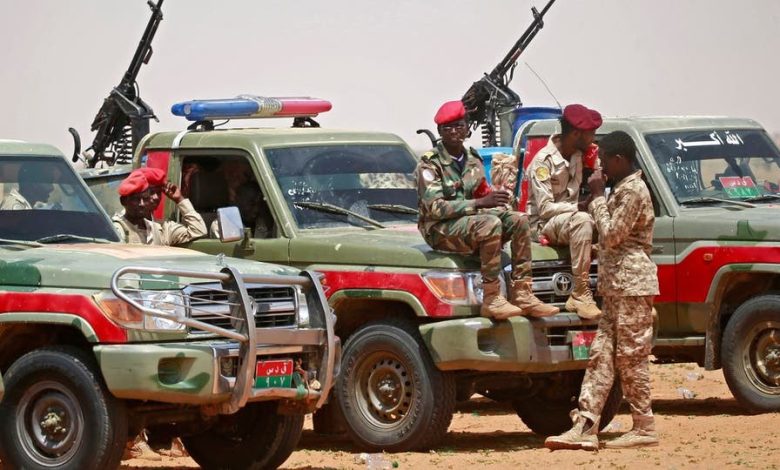Where Is the Militia Headed After Declaring General Mobilization?

In a surprising move, the Rapid Support Forces (RSF) militia has declared a general mobilization, calling upon all segments of society in areas under its control (specifically South and East Darfur states). This step signals the growing security challenges now threatening its positions.
This mobilization—unprecedented in its scope—reflects RSF leadership’s acknowledgment of increasing military pressure as clashes escalate across several fronts in western Sudan.
The development coincides with significant advances by the Sudanese army and the joint forces of the armed struggle movements in North and West Kordofan, alongside expansion operations toward Darfur. These shifts are reshaping the balance of power, as factions allied with the army aim to secure key regions in Darfur, placing the RSF in a more defensive and precarious position.
Mobilization and Recruitment
In South Darfur, the so-called civil administration affiliated with the RSF issued strict mobilization orders targeting various social groups. These directives demand the participation of youth, students, and even commercial and religious sectors in the current military efforts.
Observers and analysts believe this step is an attempt to reinforce ranks in the face of the Sudanese army’s rapid progress and its allies. However, questions remain regarding the actual effectiveness of this mobilization in altering the power dynamics on the ground.
A local community leader from Nyala, who spoke anonymously to Al Jazeera Net, said the ongoing forced mobilization in the area reveals a severe crisis within RSF ranks. The group is suffering from a significant shortage of fighters due to recent losses in Khartoum and Omdurman.
He added that some communities have grown increasingly resentful, viewing this call-up as a desperate attempt to recover irretrievable losses. The growing pressure on civilians may lead to widespread rejection, especially amid dire humanitarian conditions in certain regions.
Loss of Capabilities
Colonel Ahmed Hussein Mustafa, spokesperson for the Joint Forces of the Armed Struggle Movements, told Al Jazeera Net that the RSF’s calls for youth to join the war are nothing but a continuation of the Dagalo family’s agenda, which serves narrow personal interests. He asserted that the RSF represents the extension of foreign agendas that provide it with military support to establish influence and loot Sudan’s resources.
He further clarified that the Joint Forces and the national army do not oppose any community group but are focused on defeating the militia, which is associated with numerous violations and crimes.
Meanwhile, former RSF advisor Yaqoub Al-Damouki told Al Jazeera Net that the RSF has lost all its military strength and manpower following repeated defeats in Khartoum and Omdurman. After these setbacks, each tribe has focused only on defending its local area and lacks the capacity to reengage in large-scale fighting. He described the ongoing mobilization as a clear sign of the RSF’s weakness in terms of human and logistical resources.
He noted that the current preparations reflect the difficult reality the RSF is facing and indicate a significant erosion of its combat capabilities. These challenges may heavily impact its position and could signal its collapse in the near future.
Social Disintegration
Analysts warn that forced mobilization and the threat of punishment are beginning to fracture the social fabric in RSF-controlled areas. Signs of community division are emerging, threatening stability in these regions.
Political activist Adam Suleiman told Al Jazeera Net that forcing people to fight has sparked “widespread discontent” among local leaders and residents. Many now feel compelled to engage in a war they fundamentally oppose.
Such policies, Suleiman added, may worsen existing internal divisions. He referenced the killing of Al-Tahir Idris Youssef, deputy chief of the Falata tribe, in the Tulus market in South Darfur. The incident was followed by a wave of arrests by RSF targeting community leaders, including Al-Omda Ahmed Mohamed Ismail, Al-Omda Mohamed Adam Allah Jabo, and Al-Omda Ishaq Abdel Jabbar, on charges related to the incident and other unspecified reasons.
He emphasized that ongoing military pressure and forced mobilization could trigger new waves of displacement and increase social tensions, deepening divisions within local communities and exacerbating instability.
The Sudan Doctors Network reported that RSF detained 178 people—including medical staff—in the city of El Daein, East Darfur. They were forced to either join RSF ranks or pay a ransom.
In a Facebook post, the network condemned these actions as “forced detention and civilian conscription into the conflict,” stressing that compelling people to fight violates international humanitarian laws.
They denounced the arrest of nurse Hamdan Abdullah Musa, whose family was given the choice between paying a ransom or having him sent to the front lines.
The network declared that the events in El Daein constitute a clear crime against unarmed civilians and called on the international community to pressure the RSF to end its violations of international norms.
Under Pressure
As battles intensify, analysts suggest that the coming clashes will determine whether the RSF’s general mobilization can stabilize its positions—or whether it is merely a final move before an impending collapse.
Dr. Adam Hassan, a sociology researcher at the University of El Fasher, argued that forced mobilization does not only impact the military balance but also has severe consequences for civilians, especially vulnerable groups such as women, children, and the elderly.
Hassan pointed out that coercive measures force families to send their members to fight, creating fear and instability in communities. As men are conscripted, women face mounting challenges in securing basic needs amid service shortages and lack of income.
Source: Al Jazeera Net



